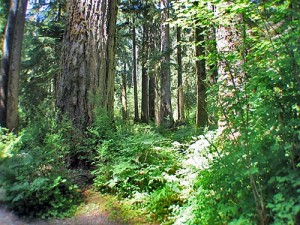Dickinson to Durban » Key COP17 Issues » Why IS REDD important?
Why IS REDD important?
By Sam Pollan, ‘14
I asked this question twice today. First, I asked this to IPCC chairman Dr. Pachauri over breakfast and later over lunch with USAID’s climate change head, Bill Breed. It has come forward as one of the primary topics of discussion in the past few COPs, but again I ask: why is REDD so important in these negotiations. The answer is quite a bit more complex than the question but basically it comes down to two main reasons: it is cost effective and it is a topic that countries generally agree is a good thing.
 Emissions from land use change make up a considerable amount of GHG emissions, especially when the conversion is from primary forest to practically anything else. By not cutting down forests and reforesting areas, significant amounts of carbon can be sequestered for long periods of time. This is a relatively cheap method of reducing emissions and sequestering carbon, especially when comparing it to other CCS methods that are currently being developed. Furthermore, most REDD initiatives can provide significant economic potential through eco-tourism and sustainable harvesting. Protecting and expanding forests yields several other benefits as well such as biodiversity and ecosystem preservation.
Emissions from land use change make up a considerable amount of GHG emissions, especially when the conversion is from primary forest to practically anything else. By not cutting down forests and reforesting areas, significant amounts of carbon can be sequestered for long periods of time. This is a relatively cheap method of reducing emissions and sequestering carbon, especially when comparing it to other CCS methods that are currently being developed. Furthermore, most REDD initiatives can provide significant economic potential through eco-tourism and sustainable harvesting. Protecting and expanding forests yields several other benefits as well such as biodiversity and ecosystem preservation.
Because of these economic and external benefits, most countries agree that REDD is a valuable tool for climate change mitigation. The overarching support is particularly important when addressing REDD because it can help stem problems such as leakage. REDD will be the most effective as a border-to-border institution so that when an area is proclaimed as protected, loggers cannot simply move to  the plot over and clear that instead.
the plot over and clear that instead.
There are, however, several areas that still need fine-tuning. Reference levels, for example, need to be established. The current problem with reference levels is that while they are still being established, countries like Brazil have reconfigured their legislation to manipulate their deforestation figures. After a record drop in deforestation levels, Brazil recently announced a new forestry policy that more or less encourages clearing of the Amazon as an effort to create “hot air” once reference levels are established. Indigenous rights are also being aversely affected by many REDD programs and the “carbon cowboys” I discussed in an earlier post. While REDD deliberations appear to be solving these technical issues, they are still moving much to slowly. Current projects have allowed for plenty of exploration in troubleshooting and now it is time to stand up from the negotiating table and take definitive action.
Filed under: Key COP17 Issues · Tags: Bill Breed, Brazil, Pachauri, REDD-Reducing Emissions from Deforestation and Forest Degradation, Sam Pollan








Sam,
Do you think agreement on REDD is one of the small steps that will be achieved at Durban? If a major commitment can not be achieved, perhaps focusing on some of these smaller but significant measures is an important strategy?
J Ball
I think that several aspects of REDD are being clarified in the negotiations. We should see some positive conclusions on REDD before the conference is over. The results may not be perfect but it is definitely a good place to be at. As for focusing on other small but significant issues rather than a broad, insufficient commitment, I think that needs to happen. There are over 70 agendas that need to be discussed in a two week period. I think that the members are realizing the inefficiencies of arguing over semantics between 190 countries. In one of the plenary sessions I sat in on, the motion to allow ministerial bodies to fine tune their plan so that not all of the delegates are spending time on something that affects only one or two people. I think this is indicative of a trend towards focusing on solvable problems and allowing individual countries to smooth out the wrinkles.